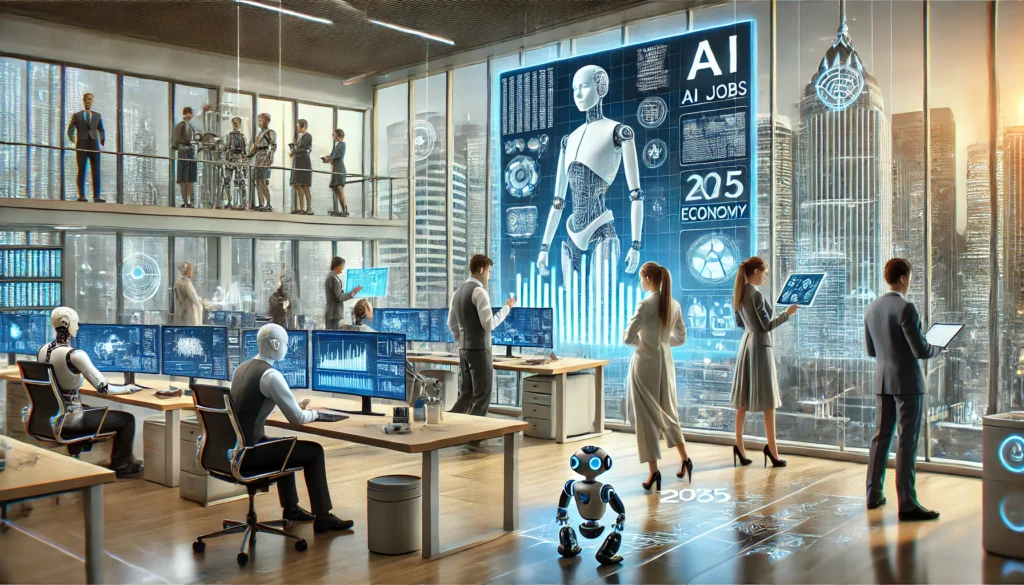The AI revolution isn’t coming—it’s already here. As we approach 2025, artificial intelligence is projected to reshape 40% of global jobs (World Economic Forum), creating new roles while phasing out outdated ones. Whether you’re a student, professional, or career switcher, understanding the AI-driven jobs of tomorrow is critical to staying ahead. In this guide, we’ll explore the top 10 careers set to dominate the 2025 economy and how to prepare for them. For a broader perspective, read our analysis of How AI Will Reshape Global Industries by 2030.

Why AI is Reshaping the Job Market
To begin with, AI won’t just replace jobs—it will enhance human capabilities through automation-augmentation synergy. Meanwhile, industries like healthcare and finance are investing billions in AI tools, as highlighted in Gartner’s 2025 Tech Trends Report, fueling demand for new skill sets. Consequently, analytical thinking and AI literacy are becoming non-negotiable for professionals.
“Start future-proofing your career today—the age of AI waits for no one. For a step-by-step guide, read our post on How to Transition into an AI Career in 2025.”
Top 10 AI-Driven Careers for 2025
1. AI Ethics Officer
As AI adoption accelerates, ethical concerns about bias and transparency are mounting. This is where AI Ethics Officers step in, ensuring compliance with frameworks like the EU AI Act. For instance, they audit algorithms in hiring tools to prevent discrimination, as seen in IBM’s AI Fairness Toolkit. Given rising public scrutiny, this role is poised to grow 45% by 2025 (LinkedIn).
2. Machine Learning Engineer
While AI Ethics focuses on governance, Machine Learning Engineers build the technology itself. From healthcare diagnostics to retail personalization, they design models that drive innovation. However, mastering Python and TensorFlow is essential—thankfully, platforms like Google’s ML Crash Course simplify the learning curve.
3. AI-Powered Healthcare Specialist
In contrast to traditional roles, these specialists merge medical expertise with AI tools like PathAI. By analyzing vast datasets, they enable early disease detection—a critical advantage for aging populations. As a result, hospitals are aggressively hiring professionals who bridge clinical and technical domains, as discussed in Nature Medicine’s AI in Healthcare Review.
4. Robotics Maintenance Technician
While robots automate factories, they still require human oversight. Take Amazon’s Kiva robots, for example: technicians troubleshoot malfunctions and optimize performance. Although this role is hands-on, IoT and mechatronics certifications, like those from Coursera’s Robotics Specialization, can fast-track entry into this high-demand field.
5. AI Cybersecurity Analyst
As cyberattacks grow more sophisticated, AI-powered defenses become indispensable. These analysts deploy predictive systems to counter threats—a necessity, given that cybercrime costs could hit $10.5 trillion by 2025 (Cybersecurity Ventures). Therefore, skills like ethical hacking and AI threat modeling are now career goldmines. Dive deeper with MIT’s AI in Cybersecurity Course.
6. AI Product Manager
Balancing technical and business priorities, AI Product Managers ensure AI tools align with market needs. For example, they might oversee chatbots that reduce customer service costs by 30%, as detailed in McKinsey’s AI Product Management Guide. Because of their hybrid skill set, they command salaries exceeding $160K.
7. Autonomous Systems Operator
While self-driving cars dominate headlines, this role extends to drones and delivery bots. Thanks to regulatory advancements, autonomous logistics fleets are scaling rapidly, as seen in Waymo’s Autonomous Trucking Program. To succeed, operators must master GIS mapping and real-time system monitoring.
8. AI Content Strategist
Although AI generates content, humans ensure it resonates with audiences. These strategists refine ChatGPT outputs for SEO and brand voice—a practice 65% of marketers now prioritize (HubSpot). Ultimately, they bridge creativity and automation. For SEO tips, explore our guide to Writing AI-Friendly Content in 2025.
9. AI Sustainability Consultant
As climate urgency grows, these consultants leverage AI to cut emissions and waste. For instance, they might optimize energy grids using predictive analytics from Google’s Carbon Sense Suite. Given the $70B climate tech boom, this role merges purpose with profitability.
10. AI Education Designer
Finally, adaptive learning platforms like Khan Academy’s AI Tutor are revolutionizing education. By integrating AI tutors, designers create personalized curricula—a trend fueled by $400B in EdTech investments (HolonIQ). Thus, instructional design skills paired with NLP knowledge are highly marketable.
How to Prepare for an AI-Driven Career
To future-proof your career, follow these steps:
- First, upskill with courses like DeepLearning.AI’s Prompt Engineering Program.
- Next, build a portfolio showcasing AI projects on GitHub or LinkedIn.
- Additionally, network in communities like Kaggle or Women in AI.
- Most importantly, embrace lifelong learning—after all, AI evolves rapidly. Start with our curated list of Top AI Certifications for 2025.
Conclusion
In summary, the 2025 job market will reward those who adapt to AI’s transformative power. From healthcare to sustainability, these roles blend technical prowess with human ingenuity. While challenges exist, the opportunities are boundless—so start preparing today. For more insights, explore The Future of Remote Work in an AI-Driven World.
FAQ Section
Q: What’s the highest-paying AI job in 2025?
A: Unsurprisingly, Machine Learning Engineers and AI Product Managers lead with salaries over $150K. Compare salaries globally in our 2025 AI Salary Report.
Q: Can I work in AI without a coding background?
A: Absolutely! Roles like AI Ethics Officer prioritize ethics and governance over programming. Check out 5 Non-Coding AI Careers to Explore.
Q: Will AI replace human jobs?
A: While automation will displace some roles, AI will create 97 million new jobs (WEF)—proving adaptation is key.
